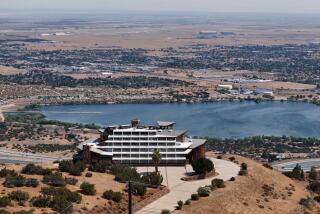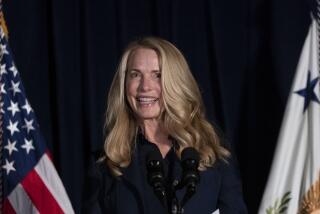Residents to Buy Malibu Mobile Home Park
- Share via
Residents of a mobile home park at Malibu’s Paradise Cove have agreed to buy the 80-acre property overlooking the Pacific Ocean, including the popular Sand Castle Restaurant, ending speculation that an investor might try to build a luxury hotel there.
A spokesman for owner Dorothy Kissel said that an agreement was reached last week and that escrow is to close in September.
Although the price was not disclosed, a source familiar with the negotiations said the buyers agreed to pay “just under $80 million.”
“What most of us wanted was the chance to continue living here, so we’re very pleased,” said Brad Johanson, president of the Paradise Cove Acquisition Assn., which is buying the property in a joint venture with California Park Properties Inc. of Escondido. The acquisition group includes all of the park’s more than 250 residents.
California Park Properties is an investment group whose officers include L. Sue Loftin, a lawyer who heads a group that helped the residents put together their offer. A spokesman for Loftin said she was unavailable for comment.
Dorothy and Harry Kissel bought the Paradise Cove property 26 years ago and, on the hunch that it would someday be worth a fortune, turned most of the land into an idyllic mobile home park where corporate executives looking for a weekend escape live next to full-time residents on fixed incomes.
Now in her 70s and a widow, Kissel announced in February that she had decided to sell the property.
Speculation about its value among real estate appraisers, including some close to the residents, had ranged from $70 million to $130 million.
The broker offering the property didn’t even put a price tag on it and shunned publicity about its impending sale, saying that Kissel preferred a “low-key approach” to the sale and that the publicity wouldn’t help attract the kind of wealthy investors Kissel was seeking.
In an interview this week, David Ash, vice president of Eastdil Realty Inc. of Century City, provided little information about the sale. “These things are always sensitive until the actual closing,” he said.
Some observers said residents’ success in acquiring the property may have been helped by uncertainty over Malibu cityhood and what incorporation might mean for attempts to develop the property.
“With the hoops a would-be developer would face with the (state) Coastal Commission, not to mention a new City Council that might be hostile to growth, I’m not surprised there were no takers willing to pay more,” said a real estate attorney, who spoke on condition that he not be identified.
As a result of the acquisition, residents will have the chance to buy the parcels beneath their homes at prices expected to range from less than $100,000 to more than $500,000, in the case of parcels with ocean views.
The resident group and others in the community have said they want to see the seaside restaurant, which has long had a lease with Kissel, continue operating there. Local environmentalists, concerned that the mobile home park might be acquired by a developer with plans for a hotel or some other large project, said they were pleased that the residents will acquire it.
“It’s always nice when the good guys come out on top,” said Ellen Stern Harris, executive director of the Fund for the Environment, who had expressed concern that Paradise Cove not become “an enclave for private developers.”
Harris and other environmentalists have talked to the resident group about placing part of the property, including an access road from Pacific Coast Highway and a pier next to the restaurant, in a public land trust as a way of ensuring access. The prospective new owners have expressed interest in the idea, she said.
Half a mile off Pacific Coast Highway and hidden by rugged bluffs, the beach at Paradise Cove, long popular with surfers, is almost impossible to get to except by the private access road that stretches across the property.
For years, beach-goers not patronizing the restaurant have paid a fee to park in a beachside parking lot, and Kissel has made the pier--which was partially destroyed by a 1983 storm--available to the public.
Johanson said the group has an interest in accommodating public access to the cove and has talked with the California State Coastal Conservancy about developing an access plan.
“At this point, we’re referring those kinds of issues to (the conservancy),” he said.
More to Read
Inside the business of entertainment
The Wide Shot brings you news, analysis and insights on everything from streaming wars to production — and what it all means for the future.
You may occasionally receive promotional content from the Los Angeles Times.









